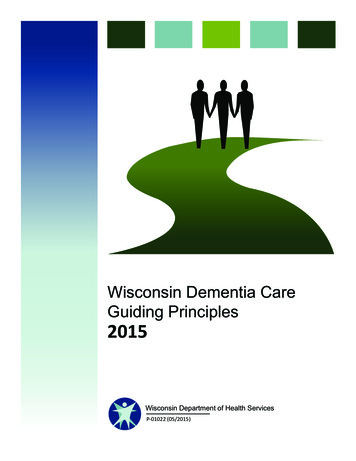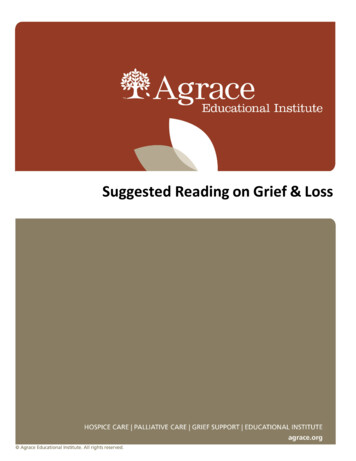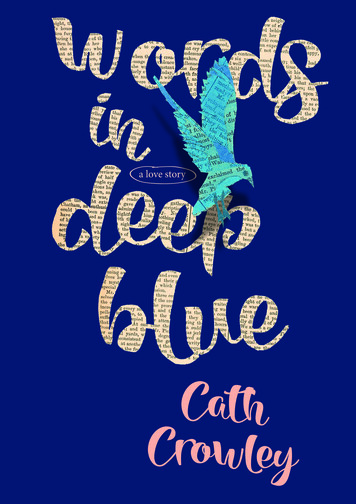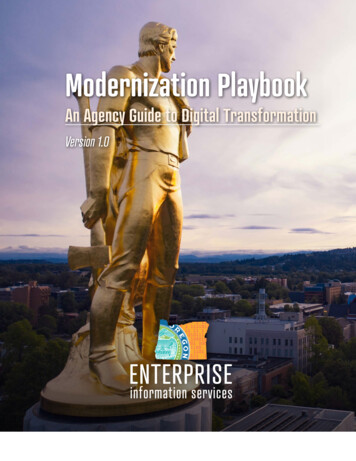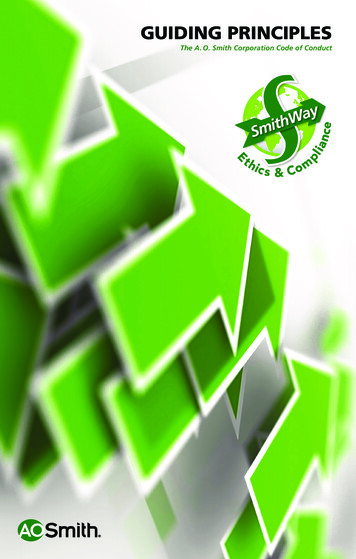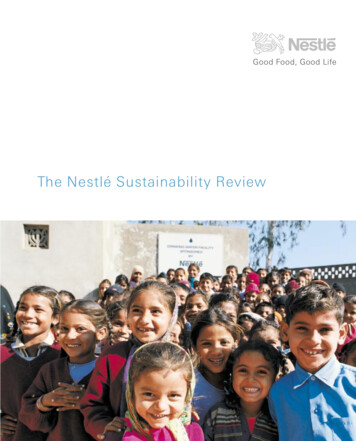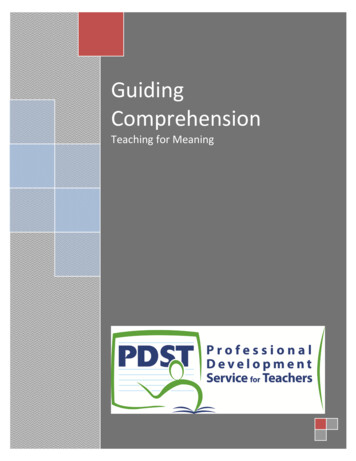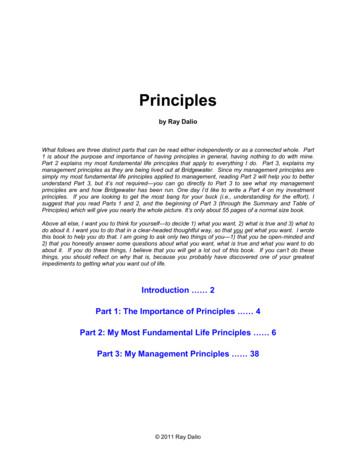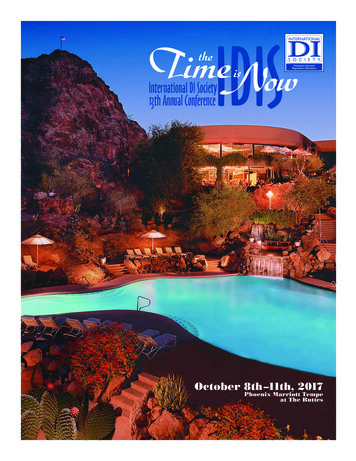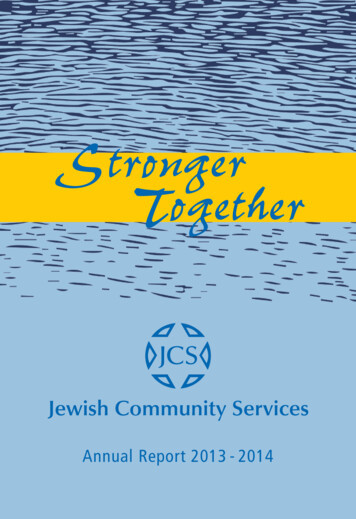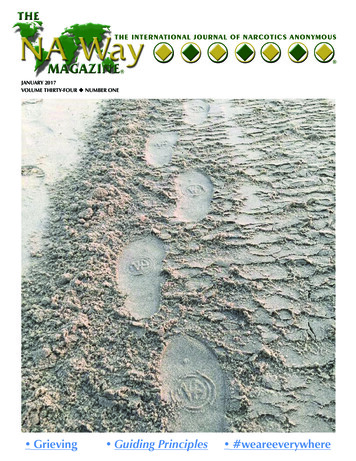
Transcription
JANUARY 2017VOLUME THIRTY-FOUR NUMBER ONE Grieving Guiding Principles #weareeverywhere
From the editorTheInternational JournalofNarcotics AnonymousThe NA Way Magazine, published inEnglish, Farsi, French, German, Japanese,Portuguese, Russian, and Spanish, belongsto the members of Narcotics Anonymous. Itsmission, therefore, is to provide each memberwith recovery and service information, as wellas recovery-related entertainment, which speaksto current issues and events relevant to eachof our members worldwide. In keeping withthis mission, the editorial staff is dedicated toproviding a magazine which is open to articlesand features written by members from aroundthe world, as well as providing current serviceand convention information. Foremost, thejournal is dedicated to the celebration of ourmessage of recovery—“that an addict, anyaddict, can stop using drugs, lose the desire touse, and find a new way to live.”NA World Services, Inc.PO Box 9999Van Nuys, CA 91409 USATelephone: (818) 773-9999Fax: (818) 700-0700Website: www.na.orgThe NA Way Magazine welcomes the participation of its readers. You are invited to share with the NA Fellowship in ourquarterly international journal. Send us your experience inrecovery, your views on NA matters, and feature items. Allmanuscripts submitted become the property of NarcoticsAnonymous World Services, Inc. Subscription, editorial, andbusiness services: PO Box 9999, Van Nuys, CA 91409-9099.The NA Way Magazine presents the experiences and opinions of individual members of Narcotics Anonymous. Theopinions expressed are not to be attributed to NarcoticsAnonymous as a whole, nor does publication of any articleimply endorsement by Narcotics Anonymous, The NA WayMagazine, or Narcotics Anonymous World Services, Inc. Ifyou are interested in receiving a free subscription to TheNA Way, please write to the address below or send an emailto naway@na.org.The NA Way Magazine (ISSN 1046-5421), The NA Way, andNarcotics Anonymous are registered trademarks of Narcotics Anonymous World Services, Inc. The NA Way Magazine ispublished quarterly by Narcotics Anonymous World Services,Inc., 19737 Nordhoff Place, Chatsworth, CA 91311. Periodicalpostage is paid at Santa Clarita, CA, and at additional entrypoints. POSTMASTER: Please send address changes to TheNA Way Magazine, PO Box 9999, Van Nuys, CA 91409-9099.2The NA Way Magazine – January 2017The idea of living life on life’s terms is so important to us that we have an entiresection of personal stories based on that concept in the Basic Text. We encounter thephrase in meetings, with our sponsors, and in NA literature. Many of those referencesremind us of our inability to live life on life’s terms as using addicts; but the phrasetakes on a whole new dimension when we begin to face, accept, work, and grow throughlife on life’s terms in our recovery.In her Basic Text story “Becoming Whole,” an NA member says, “Life on life’s termsis rich with miracles.” In this issue, members in Greece overcome challenges to buildstrong home groups, and a member learns great lessons as she works her Fourth Step.But let’s remember that living life on life’s terms, like many of our recovery processes,can be messy. Life’s terms confound us, weigh us down, hold us in a vise-grip. We mayendure overwhelming ups and downs for years as we struggle and mature in our recovery. And there are stories like that in this issue, too, from members willing to sharetheir struggles and successes.Recovering from addiction is about more than just not using drugs. As we stay clean, we are facedwith challenges and we are graced with gifts. (Basic Text, “Life on Life’s Terms”)De J, EditorIN THIS ISSUEFeature Life’s termsBasic caption contextSharing Grieving The Fourth Step Awakening of the spirit MZSS: Not just for service An odyssey of unmanageabilityGuiding Principles:The Spirit of Our Traditions#weareeverywhere34589Fellowship development12 CANA/ACNA Hawaii Region Learning Days Multi-Zonal Service Symposium Western Service Learning Days NA PhilippinesPicture this16Calendar17NAWS Product Update18Coming Soon20Electronic subscribers can click here for additional content.Cover photo: Kyle P, Minnesota, USAThe NA Way Magazine welcomes letters from all readers. Letters to the editor can respondto any article that has appeared in The NA Way, or can simply be a viewpoint about an issue ofconcern in the NA Fellowship. Letters should be no more than 250 words, and we reserve theright to edit. All letters must include a signature, valid address, and phone number. First nameand last initial will be used as the signature line unless the writer requests anonymity.
Life’s terms Artwork: Amanda M, Nebraska, USAI write this 40-some days shy of 40 years clean. That’s a long time. Long enoughthat I’ve changed greatly, in many ways, from who I was when I cleaned up this time.My mind and spirit, no longer shriveled into tiny, hard shells, are open and willing totry new possibilities. Most importantly, today I truly give love and accept love.However, my circumstances are rough. Though not without shelter, I have beenhomeless for the past eight months. Throughout these months, every night of every week,I’ve worked midnight shift at any of four locations, assigned with no routine or regularity.This has done much to remove me from both society at large and the NA Fellowship.It was only a month and a half ago that I again joined a home group, sacrificing bothsleep and money to be there each week—none of which is particularly unbearablefor me. Difficult? Certainly. But not unbearable. Life’s terms are sometimes hard,even harsh. I’ve been alive long enough to know that, and clean long enoughto accept it easily, because it’s so obviously something “I cannot change.”What does fill me with shame and anger (at myself) is that despite all myyears, I still mishandle many practical things, especially money. I make littlemore than minimum wage, have squandered an inheritance, and cashedin several savings plans. My finances are lousy and it is entirely of my owndoing. I’ve wasted opportunities to learn and discipline myself better. Beingso long clean and yet so fiscally unchanged—again, not circumstances, butme—fills me with shame.So, when I think of celebrating 40 years clean, my failings shout at me whilemy advancements whisper. Other folks tell me I’m an example of “staying clean nomatter what” because of my circumstances; I know I’m an example of being so muchless than I could be. I’ve questioned whether I ought to celebrate at all. I’ve questionedwhether I ought to even make the effort to reach the milestone. Deliberate relapseor actions even more drastic have rolled through my head with strong motivationspushing them. Yet, I’ve stayed clean. How is it that I don’t succumb to the despair? Cleantime. Thousands of todays in the habit of staying clean today.Our literature. “We need to go to one extra meeting and help a newcomer stay clean one extra day.”* Friends: From those with 30 years who know me so well to those with30 days who are getting their first impression. Importantly, friends whoare not afraid to be honest with me. Service. I keep purpose by giving goodwill. Our steps. If not every day, or even every other day, still—some days. NA meetings. Meetings I like, meetings I don’t like. Meetings I’m late for,meetings I leave early. One in two weeks, four in one week. Meetings.NA meetings. The Spirit of NA. The Fellowship of NA. Each a strength and each a comfortsince my very first days.And today, just for today, I’m willing to do the work to reach 14,610 days clean.We’ll see.AJ H, New Jersey, USA*Basic Text, “More Will Be Revealed”e-subscribe to The NA Way & other NAWS periodicals at www.na.org/subscribe 3e-
Basic caption contestHere’s your chance to participate in The NA Way Magazine in a whole new way. Write a caption for this image,send it to us, and you’ll be magically entered in our captioncontest. We’ll choose the best (and maybe a few others)for publication in an upcoming issue. Your prize will be thesatisfaction of seeing your name in The NA Way!Email your entry with “Basic Caption Contest” in thesubject line, and be sure to include your name and whereyou’re from in the body of the email: naway@na.org.Photo: Irene C, County Westmeath, IrelandThe NA Way MagazineNAWS NewsReaching OutNAWS Email UpdatesJust for Todaydaily emaile-subscribe:no printing costsno mailing costsdirect email delivery4The NA Way Magazine – January 2017Help createYOUR NA WayPlease share your recovery experience with the NAFellowship: stories, views on NA matters, photos, andyour original recovery-oriented artwork. We also loveto receive your local NA community’s newsletters.Electronic documents (including text documents, jpg,gif, pdf, etc.) may be emailed to naway@na.org.Visit www.naway.org for more information onsubmissions and the author release form.
GrievingPhoto: Jaime V Eternity MedallionMy beloved partner of 16 years and three months was diagnosed with an aggressiveand invasive cancer in March 2015. He had surgery and was declared clear of cancerafter a PET scan at the end of April. He started a preventative treatment that madehim sick and unable to eat most foods or tolerate his favorite foods, which led us ona search to experiment with supplements. He lost weight and energy, but did not losehope. His infectious positivity and the fact that I had been working my Third Step everyday for the 30 days prior to the clear PET scan motivated and encouraged us to havefaith that all would be well.My Higher Power and I were not on the same page, however. What I wanted andhoped for was not what my Higher Power had in mind. After a checkup at the oncologist’s office, further surgery, and scans, it turned out that despite the preventativetreatment, the cancer had spread. One round of chemotherapy followed, and thepain only increased.We still had hope. My partner read the Basic Text and Living Clean from cover to cover.We prayed; we spoke about death. We talked about our fears, and my partner seemedmore worried about how I would survive without him than being fearful of death itself.Despite engaging in the discussions, with hindsight, I believe that I was totally in denial.He died five days after the second chemotherapy treatment had been scheduled.Upon examining my partner, the oncologist told us to cancel the chemo, as there wasnothing more that could be done. My partner then lost hope and positivityand died.I felt a tearing pain ripping at my insides coupled with a quiet relief thathe was no longer going to be suffering and in pain, and that his HP wouldbe taking care of him from then onward. When the shock lifted, weeks later,I started questioning my HP’s will, but I was unable to find answers. I keptgetting back to the point of having to surrender my self-will in an attempt toaccept the reality that my partner was never coming back.Almost 14 months later, I am still struggling with life on life’s terms. Myconfidence is slowly rebuilding, but I miss him so much that it hurts.I changed sponsors after his death and I am enjoying building that newrelationship and learning to trust again. I maintained my service to my sponsees; it was helpful to have a commitment to others to take me away fromwhat I was feeling, albeit temporarily. I continued going to a weekly meetingand more than three meetings per week in the first few months. The Fellowship has been mostly supportive, but many people knew us as a couple andwere—and still seem to be—so uncomfortable and at a loss for what to sayto me that they avoided me. I know that they are also grieving, but it is hurtfulthat they haven’t reached out.e-subscribe to The NA Way & other NAWS periodicals at www.na.org/subscribe 5e-
One of my many difficulties after thedeath of my partner is getting back towriting. I am not a writer, but I have beenunable to continue with my step workand have not maintained my journal. Iam hoping that this exercise will helpme to express something of what I amfeeling and what I have felt over the pastmonths and allow me to push throughmy apparent block for the written word.Fortunately, although it did not feellike it at the time, I have work and do mybest to focus on what is in front of me ona daily or minute-by-minute basis. I amrebuilding my life, much like I did when Ifound NA, one day at a time.Cheryl B, Johannesburg, South AfricaTheFourth StepI began writing my Fourth Step forthe first time in 2003. I remember beingpetrified; it sounded daunting! To behonest, I don’t know if I finished writing it back then, but I do know I didn’tgo over it with my sponsor at the time,because I relapsed. Today, by the graceof my Higher Power, I have made it backto NA, and I’m capable of taking myinventory and completing this step withmy sponsor.This time, I’m writing from the NAStep Working Guides. While I was on theresentments section, I flipped ahead(kind of like reading the last chapter of abook because I want to know who livedor what happened). The workbook headings jumped out at me: Feelings, Guilt,Shame, Fear, Relationships, Sex, andAbuse. Talk about panic and anxiety! Myheart began to beat fast and my wholebody got warm and sweaty; I was shortof breath. I sat the book down and didn’ttouch it for three weeks. When I finallytalked to my sponsor about it, you knowwhat she told me? “Stop doing that! Takeeach question like you do each day: oneday at a time, one question at a time!”Well, of course that made sense. She toldme to just answer the questions in order,and as I approached each topic, I wouldbe prepared for them by my writing inthe previous sections. So I prayed for6The NA Way Magazine – January 2017guidance before I opened the workbookand my notebook, and then I got started.One paragraph really stood out tome in the Basic Text on Step Four in the“It Works” chapter: We review our past performance and our present behavior to see whatwe want to keep and what we want to discard.No one is forcing us to give up our misery.This step has the reputation of being difficult;in reality, it is quite simple. That tells me Idon’t HAVE to be that person anymore,that I can pick out the good, expand onit, and throw the bad out the window. Italso reminds me I don’t have to live inthe past, just address it in writing andwith my sponsor, and then let it go. It’smuch like the Second Step that allowsme to choose which attributes I wantmy Higher Power to have. This programgives me choices like this that I neverhad in active addiction. I can choose tobe miserable or to live in the solution;to not be the person I want to be, or tobe a better person than I was yesterday.So I continue to delve into my deepest,darkest memories, but when it gets toodark, I pull out my Basic Text and readthat phrase again. It pulls me back intothat light.Let’s say thatagain: I am agood person.I’m really good at making myself thecenter of attention and making sure Ilook good, even if that means you lookbad. So it’s humbling to recognize this,and to try to do something different. Mywhole personality doesn’t need to be different, but there are things that I want tochange, because it’s not who I want to betoday. Writing my inventory and lookingat my part has shown me some of thesecharacter defects and assets. I also seethat I am a good person. Wow. Let’s saythat again: I am a good person.I’m learning that my fear, while absolutely gripping, is normal. I’m allowed tobe afraid. It’s a defense mechanism thatI (we) are born with. However, I cannotlet fear paralyze me anymore. I can’t letit control my decisions or the actions Itake or don’t take. I can admit that some-thing scares me, but I can also admit I’mpowerless over my fear, allow it, and trustmy Higher Power to help me through.Being able to recognize my defectsand assets is an amazing gift that I cherish. This program is beyond amazingwhen I am truly living it, to the best ofmy ability. I don’t have to live in the pastanymore. I don’t have to hide from it,or dodge it, or lie about it. I can admitit, face it, be honest about it, and moveforward as a better person with the helpof other addicts and my HP.Wendy W, Virginia, USAAwakening ofthe spiritIt was 20 December when I had aspiritual awakening. While I was walkingthrough the streets, I felt deep down thatI liked myself. I wondered what this was.I had no idea.A few months later, I again becameconscious of my happiness. After that,on a train, the same feeling of happinesscame up again. Then I realized this maybe the sign of something. When I gothome, I looked at some NA materialsand found that with our spiritual awakening comes the sense of liberation fromloneliness and a better understanding ofhow to live. “Well, yes,” I thought, “now Idon’t feel lonely.” Doing what my HigherPower wants me to do—not use drugsand attend NA meetings—helps me tolive a better life. I realized that this waswhat I had to do.The next year, I was traveling by train,and my feeling of happiness was so greatthat I was on the verge of tears, but Ididn’t cry. I recognized this as a similarfeeling to what I had experienced before.Because I had the same sign three timesfrom my Higher Power, I knew I had trulyawakened to the spiritual.Now I wondered why my sponsorand I both used drugs. He said it wasso that he would come to like himself.Well, yes; I too used drugs to be ableto like myself, but I never actually likedmyself until my spiritual awakening on20 December. Until then, I often felt acraving for drugs, but after that, I neverneeded drugs again.
With my awakening to the spiritualcame a strong sense of profound peaceand happiness. Speaking of happiness,my sponsor used the example of beingimpatient at a red traffic light becauseit keeps him waiting. With a little experience of recovery he has learned to relaxa little in that situation. Now, when hewaits for the red light to turn green, hecan patiently wait for the change. So now,I wait calmly as though I were not waiting,and I tell myself that when it does changeI’m going to cross the street.Gian S, Tokyo, JapanMZSS: Not justfor serviceMe? Age 65, clean date November,1983. Sharing service ideas and practices.Learning how service bodies around thenation carry the message. Those were myprimary motives for attending the 2016Multi-Zonal Service Symposium (MZSS).Sharing time with other trusted servants,men and women I get to see but onceevery year or two, was an added bonus.What I wasn’t expecting, though, wassome long-overdue healing.Over the course of the weekend I kepthaving awkward moments in halls and inthe elevator. I kept running into a fellowwho had treated me disrespectfully sometime ago. I refused to acknowledge himor look at him. And yet, there he was,again and again. And there I was, ignoringhim again and again.On Sunday morning, as the symposium drew to a close, I was up early toarrange the chairs in a corner of thelobby for the 7:00 am recovery meeting.The topic was the day’s reading from theJust for Today meditation book—workinga Fourth Step. During my share I heardmyself say something that caught me offguard. “Step Four invites us to considerour resentments.” It struck me that I hadbeen resenting that particular gentlemanfor more than ten years.Huh? I’m this old, old enough toforget countless things every single day:Where is my dang phone? Did I really forget my e-reader on the bus bench? (Yes,but some kindhearted citizen turned it into the lost and found.) Are they pickingup the recycling this week or did theypick it up last week? You get the picture—I can forget a LOT of things! In contrast,I can vividly remember someone treatingme thoughtlessly more than a decade ago?!The next thing that came out of mymouth was a commitment to myself, infront of the group, that if I ran into thisgentleman one more time before departure I’d make amends for carrying thegrudge. Forgiveness is a weird thing, isn’tit? I wasn’t really sure what the properprotocol might be for dropping resentment. If I’m going to change the rulesregarding how I interact with someone,it’s probably polite to say somethingrather than expect the other party toread my mind and guess the new rule.Sitting there with my lips still flapping,I also owned out loud that I hoped ourpaths wouldn’t cross before I left thehotel for the return flight home.You know where this is going, right?I ran into him outside. Stopped him.Chatted with him as we walked to hiscar. Shook his hand. Maybe even huggedhim.When people ask me why I still goto recovery meetings, this is why. Nomatter where I am, no matter how oldI’m getting, no matter how long I stayclean, there’s always more recovery tobe enjoyed—even in the least expectedplaces, like a symposium focused ondelivering the message of recovery toothers. Sometimes the “other” is me.An odyssey ofunmanageabilityAt about 3:30 on a Tuesday afternoon, I left work, determined to get tomy doctor’s office (about 50 miles away)before they closed at 5:00 pm. I hadbeen without my diabetes medicationfor about five days because my insurancewouldn’t cover refills without anotherprior authorization request from mydoctor, and I didn’t have 800 to pay forthe medication out of my own pocket. Iwasn’t able to get to the doctor’s officethe previous Friday or Monday beforethey closed, so after five days of highblood sugars and becoming increasinglyunable to concentrate, my plan was toget to the clinic before 5:00 pm to atleast get some free samples until myinsurance situation resolved. While thiswasn’t the ideal situation to have gottenmyself into in the first place, I knew I hadto do my best to do what I needed to doto take care of myself—something I’mcontinually working on in my recovery.After leaving the office, I realized, inmy near-delirious state, that I didn’t havemy wallet.!Matt S, California, USAClick here to read the restof Matt's odysseyKit E, Minnesota, USAHelp createYOUR NA WayPlease share your recovery experience with the NA Fellowship: stories,views on NA matters, photos, and your original recovery-oriented artwork.We also love to receive your local NA community’s newsletters. Electronicdocuments (including text documents, jpg, gif, pdf, etc.) may be emailedto naway@na.org. Visit www.naway.org for more information onsubmissions and the author release form.e-subscribe to The NA Way & other NAWS periodicals at www.na.org/subscribe 7
Guiding Principles:The Spirit of Our TraditionsGuiding Principles was created as a “modular” workbook, so that the sections within each chapter can be used in a variety of ways.Every chapter starts and ends with a reading that can be used as a personal meditation, a recovery meeting topic, or a servicesetting discussion topic. There are also sections with writing, discussion, or workshop questions for members, groups, and servicecommittees.The “Word by Word” and “Spiritual Principles” exercises ask us to look at the words, phrases, and spiritual principles of eachTradition as a way to better understand and practice the Tradition as a whole. We might use a dictionary to look up specific wordsor phrases as part of a personal writing exercises, or we might discuss spiritual principles connected to the Tradition in a groupbusiness meeting or in a service committee meeting.In the October 2016 NA Way, we published some sample questions from the Guiding Principles chapter on Tradition One. In thisissue, we’re sharing excerpts from the “Word by Word” and “Spiritual Principles” sections of the Tradition Two chapter.Word by WordDefine, expand on, or clarify the words or phrasesfrom this Tradition, one at a time or in relation to eachother, for writing or discussion with your sponsor orother NA members.Example: servantTo be a servant may mean attending to others ina relationship of inequality, but this is not the onlyway to understand the term, nor is it the meaningthat applies when we use the term in NA. Othermeanings of the word include a person who isdevoted, is useful or beneficial, cares for others, orworks toward a purpose. A servant acts with careand devotion. It is a role of trust, not authority.We usethis language because no individual is ever to havesole ownership over any part of NA. We serve ourFellowship in humility and gratitude, recognizingthe importance of everyone’s contributions. Whenwe strive to serve selflessly, our purpose, ratherthan our personality, is primary. The task, purpose,and process are all spiritual.Serving changes us. Just as making amendsteaches us to be more forgiving, selfless servicebrings generosity, compassion, and awareness ofpurpose. Service is practice for how we live in theworld. It’s an opportunity to give what has beenso freely given to us, and to recognize how mucheffort goes into the blessings we take for grantedin and out of Narcotics Anonymous.8The NA Way Magazine – January 2017Spiritual PrinciplesEach Tradition embodies a variety of spiritual principles. The list of principles and values below may beuseful as we consider applications of this Tradition.Explore them in writing or discussion with your sponsor or other NA members. If other principles or valuesnot listed below seem relevant for you, include thoseas well. unity surrender acceptance commitment selflessness love anonymity safety hospitality empathy goodwill humilityExample: loveLove is one of the driving forces in NarcoticsAnonymous, and yet Tradition Two is the only Tradition in which the word love appears. The lovingspirit that binds us together is greater than ourindividual personalities. A spirit of love gives lifeto anonymity, allowing us to come together inunity. Being a trusted servant, acting in a spirit oflove, and trusting a Power greater than ourselvesare all part of practicing this Tradition. The lovewe share in NA means we care enough to saveeach other’s lives. The most loving things we dofor each other aren’t always easy or gentle. We tryto approach each other and our service with kindness, care, and concern, and to find courage toreach out to each other with honesty and compassion.
Regardless of who we are, where we’ve been, orwhat we’ve done, we find in Narcotics Anonymousa place of empathy, acceptance, welcome, andbelonging. We don’t find it with everyone, butanonymity frees us to experience love, and thatlove, in turn, frees us to accept one anotherwithout reservation. The Second Tradition tellsus that a loving God may express Himself in ourgroup conscience, but it’s hard to hear a lovingGod when we are being unloving. Unity dependson our willingness to keep coming from love, evenwhen that seems like the hardest thing to do. It’s aspiritual exercise that changes us, and a spiritualcommitment that ensures our survival.As Guiding Principles was developed, we received a great dealof helpful feedback through the review-and-input process onall aspects of the book, and now we’re looking forward to hearing about your experiences using Guiding Principles. One of theFellowship Issue Discussion Topics (IDTs) for this Conferencecycle is “How to Use Guiding Principles,” so we hope memberswho want to know more about the book will facilitate and/orparticipate in these workshops. We encourage all who use thebook to pass along experiences and suggestions for othersabout ways you have made the most of your work. To shareyour feedback, please email us at worldboard@na.org.For more information about the Guiding Principles IDT (andthe other IDTs), please visit www.na.org/IDT where we’ll beposting workshop/discussion outlines and other resourcematerials.e-subscribe to The NA Way & other NAWS periodicals at www.na.org/subscribe 9e-
#weareeverywhereThe NA Way Magazine, January 2017 10The NA Way Magazine – January 2017Photos: Timmy L, Andi M, and Jaime V; Massachusetts, USAe-subscribe to The NA Way & other NAWS periodicals at www.na.org/subscribe 11
Fellowship developmentEverything that NA World Services (NAWS) does is a part of Fellowship development and A Vision for NA Service drives all of ourefforts. Communication, connection, and collaboration are all necessary for effective FD, so it’s always important to stay abreast ofour constantly developing Fellowship to be clear about what World Services can and should do—and what might be better handledby a neighboring NA community or service body. This requires ongoing collaboration and communication. In many cases, NA WorldServices helps connect people initially, bringing together disparate NA members and communities—and then those communities,supported by local members, grow exponentially.CANA/ACNAMississauga, Ontario23–25 September 2016The Canadian Assembly of NA/l’Assemblée canadienne deNarcotiques Anonymes (CANA/ACNA) is a zonal forum thatcovers and serves all of Canada. CANA/ACNA meets yearly inconjunction with the Canadian Convention of NA/Conventioncanadienne de Narcotiques Anonymes (CCNA) to discuss issues affecting NA communities in Canada, including Fellowshipdevelopment and outreach efforts taking place throughout thecountry. The assembly currently consists of representatives fromfive regions: British Columbia, Al-Sask, Ontario, Quebec, andCanada Atlantic, as well as members from the Winnipeg area.CANA/ACNA has invited NAWS to attend their assembly eachyear for well over a decade now. Attending CANA provides uswith a great opportunity to meet with all of the zone’s regionaldelegates and alternates in a single setting, and to provideinformation and support to other Canadian trusted servantsand interested members who attend. We are typically allotteda significant portion of time in the agenda for NAWS sessions.At the 2016 CANA/ACNA, we provided a NAWS Update and facilitated sessions on Public Relations/Fellowship Developmentand Applying Our Principles in Social Media and Technology. Weparticipated in discussions on strategic planning, public relations, and many other topics during the assembly meeting. Wealso held an evening session, Welcoming All Members, w
use, and find a new way to live.” NA World Services, Inc. PO Box 9999 Van Nuys, CA 91409 USA Telephone: (818) 773-9999 Fax: (818) 700-0700 Website: www.na.org ics Anonymous World Services, Inc. The NA Way Magazine is The NA Way Magazine, published in and features written by members fr
